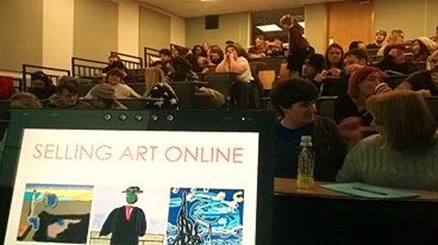Group Size
?
1.) Small group (teams of 4-6)
2.) Individual Task
3.) Large Group
4.) Any
Large Group
Learning Environment
?
1.) Lecture Theatre
2.) Presentation Space
3.) Carousel Tables (small working group)
4.) Any
5.) Outside
6.) Special
Lecture Theatre
QAA Enterprise Theme(s)
?
1.) Creativity and Innovation
2.) Opportunity recognition, creation and evaluation
3.) Decision making supported by critical analysis and judgement
4.) Implementation of ideas through leadership and management
5.) Reflection and Action
6.) Interpersonal Skills
7.) Communication and Strategy
1Creativity and Innovation
2Opportunity recognition‚ creation and evaluation
5Reflection and Action
A large proportion of art and design students and graduates will take responsibility for marketing and selling their own work. As such, sales and marketing skills coupled with the ability to identify and create new sales and marketing opportunities, are essential for these students. Furthermore, those who lack knowledge and understanding of online sales opportunities, will miss out on a huge potential market for their work, and limit their chances of success.
As a part of the Creative Futures Conference 2015, a creative industries conference for art, media, design students and professionals held at Glyndwr University, the workshop ‘Selling Art Online’ was delivered to address this challenge.
The workshop was delivered in a one hour session, by the University’s enterprise support service - ZONE, to a cohort of approximately 60 students in a lecture theatre environment. The students were from various levels of study, with mixed experience of business and marketing, and came from a wide range of art, design and creative courses.
The activity follows the structure outlined in the ‘Selling Art Online’ PowerPoint presentation, inclusive of all links and examples.
Pre-Activity

Figure 1: Students taking their seats for the Selling Art Online workshop
Introduction
Why Bother?
What does selling online mean?
Making a plan
Finding the right place to sell
How others have done it
Conclusion
Students were attentive and engaged throughout the session, and reported finding it enjoyable and useful. A number of those in attendance went on to utilise further enterprise support available at the University as a direct result of their attendance.
When asked to reflect on the session, learner comments included;
When asked what actions learners would take as a result of the session, comments included;
With thanks to the Careers team at Glyndwr University.